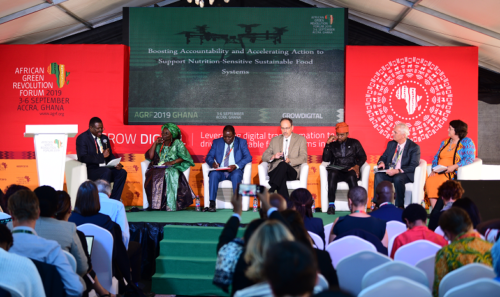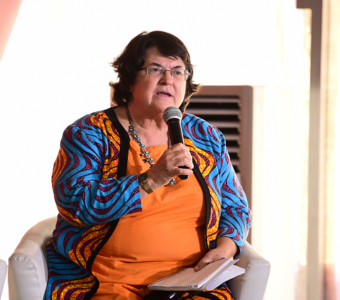The scale of the nutrition challenge facing the world is huge and if governments do not get a grip on the problem, our global food system could end up bankrupting our health systems.
Malnutrition costs the African economy an estimated USD 25 billion a year, or 11% of GDP, and while major progress has been made in improving the nutritional status of Africans over the last decade, more concerted efforts and greater accountability are needed across the continent to meet this challenge.

On 3 September at the Accra International Conference Center, experts from across the world recently discussed the role of global calls to action such as the EAT-Lancet report and the African Development Bank’s Continental Nutrition Accountability Scorecard in getting governments to deliver on their nutrition commitments. The session—Boosting accountability and accelerating action to support nutrition-sensitive sustainable food systems—was part of the African Green Revolution Forum (AGRF), held in Ghana’s capital. Considered the world’s most important and impactful forum for African agriculture, AGRF brings together stakeholders form across the agricultural landscape to share lessons and take practical actions that will move African agriculture forward.
The speakers explored how committed leaders can deliver— or in some cases already are delivering—on recent global calls to action on nutrition. Opening the session, Laurence Haddad, director of GAIN and 2018 World Food Prize laureate, outlined various elements that are essential for reducing malnutrition which include: the desire and motivation to make agriculture nutrition sensitive through evidence-based actions; a narrative to change hearts and minds; data to measure success; dialogue on opportunities for joint action; design of a food system action plan, and decisions prioritized by government.

International Potato Center scientist and 2016 World Food Prize laureate Jan Low said she welcomed the EAT Lancet report on sustainable and healthy diets, because it has helped people recognize and focus on the inextricable link between human health and environmental sustainability. “EAT has created the impetus to act now. It has underlined the urgency of reducing our food print. We need to reduce water use, increase our use of biodiversity, and we need to act now, because we do not have a lot of time,” she said.
Roy Steiner, managing director of the Rockefeller Foundation Food Initiative, called on development donors to think more systematically about the challenges facing the world and to plan for the long term. “Rather than thinking of the next five years, we should be thinking of harvesting the benefits of investment in 15 years,” he observed “there are huge gaps in our knowledge and we need to understand how changes in consumption lead to changes in nutritional outcomes.”
Debisi Araba, Regional Director for Africa for the International Center for Tropical Agriculture (CIAT), spoke of how over the last 50 years the CGIAR concentrated on increasing production and productivity, focusing on calories of food per unit produced. “If we look at the EAT Lancet Report, we see that our food systems are broken,” Araba noted. “We need government, private sector and consumer consensus to help us make better decisions. And the Nutrition Accountability Scorecard helps us identify the right partners with whom we can map out pathways to prosperity.”
Araba explained that there is a need to refine and adapt the EAT recommendations, which include reducing consumption of animal protein and tuber crops, for each major sub-region, particularly in developing countries. “Many people living in Africa need to eat more animal-sourced food, not less. That is a developed country perspective. EAT considers roots and tuber consumption in Africa as seven times higher than the desired level! Before we propose cutting back root and tuber production in Africa to one seventh of its current level, we need to be sure it will not cause massive food insecurity on this continent.”
Rather than describe food systems as bankrupt, Haddad said they were pointed in the wrong direction. He stressed that governments need to play their role, as they hold most of the policy levers. While they cannot act alone, they can do a lot to create a conducive environment to promote long-term actions by the private sector.
“Africa can build new food systems rather than copy what has not worked in other places, and key in this process is the role of small- to medium-based businesses, but they need investment,” Haddad said.
“Businesses are part of the problem, but also part of the solution. Food businesses are not like big tobacco which produces nothing positive. But big food businesses need to earn credibility.”
AGRF is an alliance of partners, including CGIAR, African Development Bank and the Bill & Melinda Gates Foundation, that care about, commit to and drive inclusive agricultural transformation in Africa.
